WHAT HAPPENED? 20 years after $6 million renovation with grand gala St. James Hotel boarded up
Published 8:44 pm Saturday, September 23, 2017
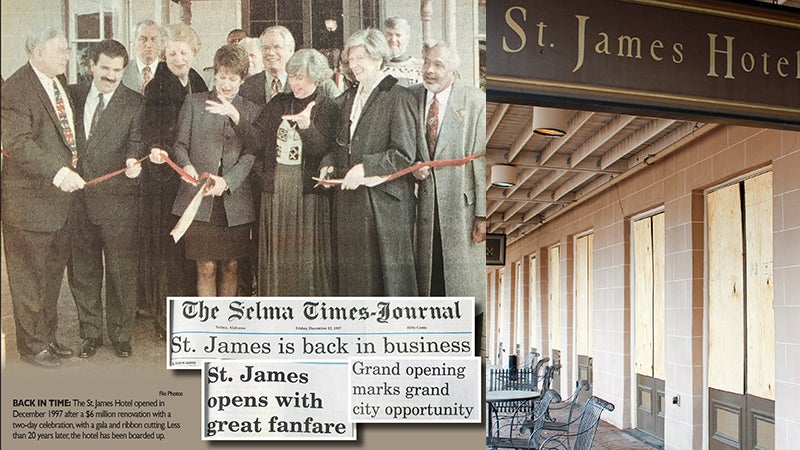
- The St. James Hotel opened in December 1997 after a $6 million renovation with a two-day celebration, with a gala and ribbon cutting. Less than 20 years later, the hotel has been boarded up.
Christmas 1997 in Selma was extra jolly. One of the city’s landmarks, the St. James Hotel had just finished a $6 million renovation. Newspaper accounts heralded the celebration with headlines like “St. James is back in business,” “Outsides agree — This is a jewel” and “St. James opens with great fanfare.”
Less than 20 years later, the same hotel is closed indefinitely and has its windows boarded up.
Many Selmians are left wondering what happened to the hotel Selma Mayor Darrio Melton has described as “the crown jewel of Water Avenue.”
CHRISTMAS CELEBRATION
The St. James Hotel is almost as old as Selma itself and was built in 1837 atop bluffs overlooking the Alabama River.
After closing as a hotel in the 1890s, the building was used for commercial and industrial purposes for more than 100 years.
Most recently, it was used as a tire shop until the late 1980s when a movement to restore the hotel starting gaining ground.
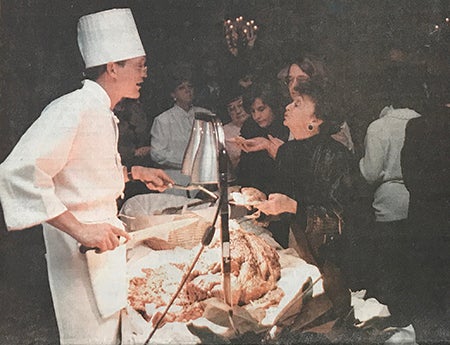
The St. James reopened with a grand gala in December 1997. At least 600 — some say 900 — people attended including former Gov. Jim Folsom and then Lt. Gov. Don Siegelman.
That effort culminated in 1997, when the renovated 42-room St. James Hotel reopened with a gala on Dec. 11 when more than 900 people donned their best attire for a night of jazz, dancing, wining and dining.
Dignitaries from across the state, including former Gov. Jim Folsom Jr., who had been out of office two years at that point, and then Lt. Gov. Don Siegelman, were in the crowd.
“I never dreamed they would do this quality of a job,” Folsom said at the time. The former governor had helped secure more than $1 million in grants for the project. “This is absolutely top-notch, first-class. It knocks your socks off. Selma can be very proud of this. The whole state can be proud of this.”
A public-private partnership funded the renovation, which was coordinated by the city of Selma and the downtown redevelopment authority. Funding came from a private investment group as well as donations from the public and state and federal grants.
The late Larry Striplin was the principal investor and hoped the new St. James would spur other improvements downtown.
“We have a lot of history that we can’t be proud of. But I’m excited about this event because it’s one of the few times in my 68 years when everybody has come together for an event. We can use this to start moving forward. We need to make sure everyone keeps focusing on the positive,” Striplin told the Times-Journal.
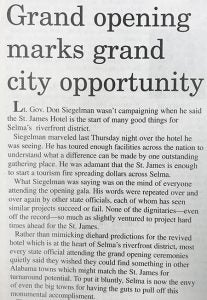
A Times-Journal editorial from December 1997 called the hotel’s reopening a “grand city opportunity.”
The late Elizabeth Driggers was the coordinator of the committee that oversaw the St. James’ transformation.
She worked alongside downtown redevelopment authority members Byrd Looper, Harlon Page and Fred Williams along with fellow committee members Elise Blackwell, Patty Sexton, Patty DeBardeleben, Gail Hoke and Rita Franklin.
“We had a grand opening for the hotel. People who didn’t even contribute came,” Blackwell remembers about the gala. “There was just an air of gaiety and expectation. It was like we have finally realized the dream.”
The committee worked for three years to raise the money needed to renovate and reopen the hotel. Visitors said the hotel and its antique furnishing could rival anything offered in New Orleans or even Paris.
“It’s nicer than I ever thought it would be. A lot of these projects do restorations, but the furnishings don’t match the time period. Here they’ve done it all,” said then director of the Alabama Historical Commission Larry Oaks, who spent the night in the St. James on its first day in operation.
Selma City Councilman Cecil Williamson attended the gala and remembers it as one with high hopes.
“I remember that is was very elaborately staged for Selma, and everyone was happy to be there and had great expectations for the hotel to be the centerpiece for the development of Water Avenue,” Williamson said.
THE FIRST DECADE
The St. James Hotel opened in style with a new manager and chef and valet parking. The hotel would go through several managers and chefs in its early years.
For most of that time, the hotel’s staff was managed for a nominal fee of $100 a year by a company Striplin was the chief investor in.
“[Striplin] had a management company that he was the chief investor in that was running it. Unfortunately, they had a couple of bad managers,” Williamson said. “It was bad management almost from the beginning.”’
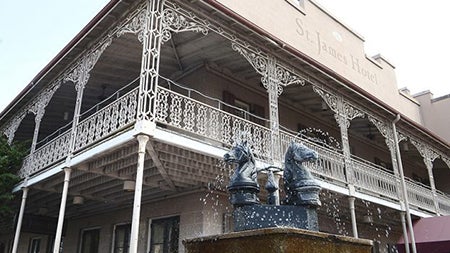
The St. James Hotel was built in 1837. It was originally named Brantley Hotel for Brigadier General John Brantley, but was renamed the Troupe House prior to the Civil War. The owner, Dr. James Gee, gave Benjamin Sterling Turner the hotel.
City Councilman Johnnie Leashore, who was on the council from 2004-2008 and was reelected in 2016, said Striplin’s company reached a point where they no longer wanted to manage the hotel.
“I guess over the years it wasn’t as profitable as it had been once. For whatever reason, Larry [Striplin] lost interest in it,” Leashore said. “I think if Larry had continued to be an investor, it could have continued to have flourished.”
Once the company Striplin was invested in opted out of managing the hotel, the city started looking for other management companies.
“The contract wasn’t renewed so that means the city had to take over management. That’s when they started to contract out with different companies,” Leashore said.
By 2007 — just 10 years after the hotel reopened — The St. James’ bar and restaurant had already closed. The iconic horse head fountain outside the hotel had rusted over and stopped working.

The hotel has had been notable guests over the years. In 1881, the hotel played host to famous outlaws Frank and Jesse James … at least legend has it.
“It was a novelty. It did well until the novelty wore off,” Leashore said. “You know if you’re not making money, you will eventually back out.”
Former-mayor James Perkins, who lead the city from 2000 to 2008, declined to comment on what happened at the hotel since he left office but recalled: “it was a big deal to identify a company that was willing to run it without city involvement.”
“The idea at that time was to keep it open and keep it an anchor facility of Water Avenue,” Perkins said.
THE SECOND DECADE
Hotel supporters say the history of the St. James reached a turning point in the summer of 2007. That’s when Gourmet Services, Inc., entered a contract with city to manage the hotel. That announcement came with plans of a bringing back a valet, concierge and fine dining restaurant.
Most of those dreams were never realized. That’s despite some upgrades like painting, purchasing new linens and towels and fixing the fountain.
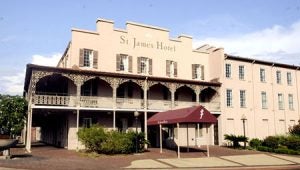
The St. James closed in 1892 after falling on hard times. It was reopened as a hotel more than 100 years later in 1997 after $6 million in renovations.
Gourmet Services was an experienced food services company, but had never managed a hotel before, and struggled for five years until the summer of 2013 when they left town just six months into a renewed five-year contract.
The St. James was left in even poorer shape with allegations of missing items and unpaid invoices — including an $80,000 tax bill.
The city threatened to sue the management company but never pursued the matter in court.
“Gourmet Services was certainly the beginning of the end,” Williamson said. “They were not a hotel company. They were a food service company and didn’t know anything about running a hotel.”
Blackwell said the hotel, renovated to be an elegant step back in time, lost its way with all the different managers.
“I think we went downhill for managers. I think it turned into more of a sports bar,” Blackwell said.
For about a year, the St. James operated with a team of volunteers and several part-time employees, along with regular cash infusions from the city, while then-mayor George Evans and the city council searched for new owners or managers. Efforts to reach Evans for comment were unsuccessful.
Strand Management out of South Carolina took over the hotel in July 2014 under a contract that called for the city to pay them a $4,000 monthly management fee or 3 percent of profits, whichever was greater.
Despite bringing in a chef from Carolina and trying to revamp the restaurant, the St. James never turned a profit under Strand’s management.
The city of Selma took over management of the St. James Hotel in March 2015 — days after the 50th anniversary of Bloody Sunday — from Strand. The city was left holding the bag again with $89,000 in past due invoices, including a $20,000 power bill.
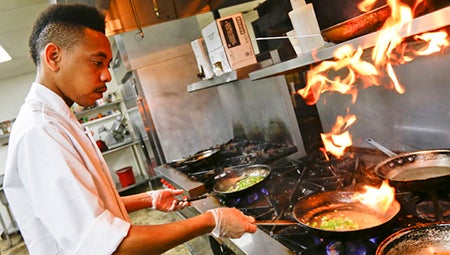
Management companies have brought in several chefs to the hotel’s restaurant over the past 20 years.
At the time, city leaders were optimistic the hotel would either sell or a new management company would be brought in within 90 days.
New owners or a management company never materialized. The council, in an effort to keep the hotel open, kept pushing back the deadline to do something, in the process losing about $25,000 a month for more than a year.
In November 2015, the city council voted to allow Councilwoman Susan Youngblood to negotiate terms of a sale with Selma native and Ivy Leaguer Mark Peterson.
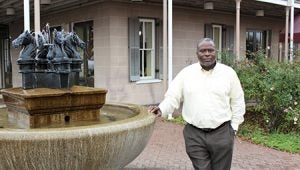
Selma native and Atlanta businessman Mark Peterson considered buying the hotel in 2016. Peterson managed the hotel for several months while weighing his options.
A 1987 graduate of Selma High School, Peterson was named the Paul M. Grist Boy of the Year before going off to Dartmouth in New Hampshire and working for Fortune 500 companies like General Mills and Accenture. He also created a company that specializes in fingerprint and data management and sold his business and became an author and consultant.
Despite no background in running a hotel or restaurant, Peterson wanted to give back to his hometown or “put a stake in the ground” as he described his intentions. He commuted from Atlanta, actually managing the hotel for few months at no cost to the city.
Peterson and the city council worked to finalize a deal from November 2015 until June 2016, when he called the agreement off, saying he wouldn’t have sufficient funds to bring the hotel up to par.
An appraisal done during the same time showed the hotel was worth $900,000 but would need $6 million in expansions and renovations to bring the structure up to flagship hotel standards.
“The problem always has been that no one can make money with a 42-room hotel in Selma, Alabama,” Williamson said. “When you have to invest so much money to get the hotel up to par. You might can make it break-even running it, but to put it in the condition to operate, you would never get your money back.”
The city spent the rest of the summer of 2016 working to list the hotel with an Atlanta real estate company that specializes in the sale of hotels. While doing that, an Illinois businessman named Kenneth Moore approached the council about his company buying the hotel for the fire sale price of $100,000.
The council initially voted to sell the hotel to Moore’s company.
That deal fell apart after information on Moore’s past, including felony identity theft charge, bankruptcies and lawsuits, came to light in a Times-Journal report.
Moore said he withdrew his offer but later sued the city for breach of contract. The city settled the lawsuit in 2017 for $30,000.
Since August 2016, the hotel has been up for sale and running with a smaller staff. A branch of FUBU — a company better known for its hip-hop apparel — expressed interest in the hotel in early 2017. HotelFUBU would go on to make an offer of $400,000 and pledged $3 million in renovations.
The company ended up pushing a closing date back several times, in an effort to get the financial backing for renovations. After a final deadline of Aug. 25 passed, the city decided to end its contract with FUBU and put the hotel back on the market.
HotelFUBU lost $25,000 in earnest money it had put up to secure the contract.
HOTEL IS BOARDED
While negotiations with hotelFUBU dragged along through 2017, the hotel continued to operate with a skeleton crew and the occasional guest. HotelFUBU asked for the St. James to be closed this summer so they could to get estimates on renovations done without inconveniencing guests.
The city council voted to close the hotel in July and hired a security firm to monitor the property 24/7 at the cost of about $10,000 a month.
Last week, Selma Mayor Darrio Melton — who was in high school when the St. James was renovated — had first-story windows of the hotel boarded up. He also ended the security detail.
Several council members have taken issue with the hotel being boarding up.
Councilwoman Susan Youngblood said the act would be the death knell for the St. James and lead to vandalism.
“If that building is empty with no security or nobody working, it is going to be vandalized and will have stuff stolen. We cannot have an empty building sitting down there. We have got to have some presence there,” Youngblood said.
Councilman Sam Randolph asked Melton during a council meeting who authorized the mayor to board up the hotel.
“I want to know why you did it. We are trying to sell it, and that hurts the value of the hotel,” Randolph said. “You put the boards up — you’ve already given up on the hotel.”
Melton said it’s incorrect to say he has given up on the hotel. The mayor said his office is working with two separate investors about buying the hotel and are still optimistic about selling it.

Some several city council members have taken issue with boarding up the St. James Hotel, but Mayor Darrio Melton said no budget has been budgeted to provide for security.
Councilman Michael Johnson said council members couldn’t complain about the hotel being boarded up while also complaining about paying for security.
“We have to make a decision about what we want to do it. We want to put security back there — then we need to vote that up. We can’t have it both ways.” Johnson said. “We complain about everything … We’ve got to quit complaining and deal with it.”
Melton said he wouldn’t fight the council if they wanted the boards taken down but told the body they would need to budget for security if they want it.
“The council has the authority to budget for that, but right now we have no money to keep the hotel open,” Melton said.
Williamson called for the hotel to be closed for years while he was on the council and estimates the city spent more than $1 million to keep the hotel open.
“The city has got to get out of the hotel business. The city cannot run a hotel,” Williamson said.
WHAT’S NEXT?
The mayor and council still have hope hotelFUBU will find the investors to help the company buy and renovate the hotel.
HotelFUBU chief operating officer Cecily Groves said earlier this month her company is still interested in the St. James.
“We absolutely don’t think the fat lady has sung. We don’t even think she is warming up yet,” Groves said.
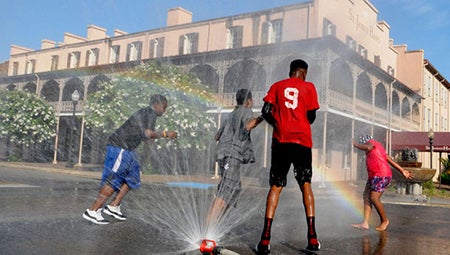
Mayor Darrio Melton said two companies are interested in buying it. The city also still hopes a deal with hotelFUBU works out.
However, the council has accepted the fact the deal might never be finalized with hotelFUBU and voted to relist the hotel with the same Atlanta real estate company. The council put a $700,000 price tag on the hotel — despite already voting to sell the property for a little as $100,000.
The council also kept the option open for hotelFUBU to come back and purchase the St. James for the $400,000 they offered.
Melton said he’s optimistic the hotel will sell but remains adamant that the city can’t stay in the hotel business.
The mayor said one prospective buyer would be ready to make a presentation to the city council as early as October.
“I’m very optimistic about the hotel, and, hopefully, within the next few weeks or months, we will have a buyer for the hotel,” Melton said.







